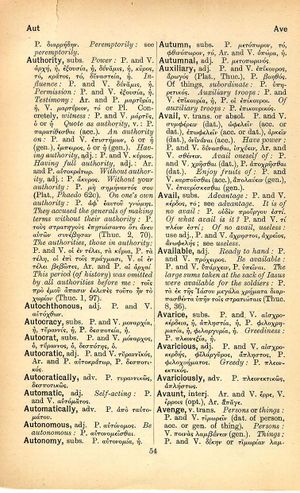authority
ἀσκέειν, περὶ τὰ νουσήματα, δύο, ὠφελέειν, ἢ μὴ βλάπτειν → strive, with regard to diseases, for two things — to do good, or to do no harm | as to diseases, make a habit of two things — to help, or at least, to do no harm
English > Greek (Woodhouse)
substantive
power: P. and V. ἀρχή, ἡ, ἐξουσία, ἡ, δύναμις, ἡ, κῦρος, τό, κράτος, τό, δυναστεία, ἡ.
influence: P. and V. δύναμις, ἡ.
permission: P. and V. ἐξουσία, ἡ.
testimony: Ar. and P. μαρτυρία, ἡ, V. μαρτύριον, τό or Pl.
concretely, witness: P. and V. μάρτυς, ὁ or ἡ
quote as authority, v.: P. παρατίθεσθαι (acc.).
an authority on: P. and V. ἐπιστήμων, ὁ or ἡ (gen.), ἔμπειρος, ὁ or ἡ (gen.).
having authority, adj.: P. and V. κύριος.
having full authority, adj.: Ar. and P. αὐτοκράτωρ.
without authority, adj.: P. ἄκυρος.
without your authority: P. μὴ σημήναντός σου (Plato, Phaedo 62C).
on one's own authority: P. ἀφ' ἑαυτοῦ γνώμης.
they accused the generals of making terms without their authority: P. τοὺς στρατηγούς ἐπῃτιάσαντο ὅτι ἄνευ αὑτῶν συνέβησαν (Thuc. 2, 70).
the authorities, those in authority: P. and V. οἱ ἐν τέλει, τὰ κύρια, P. τὰ τέλη, οἱ ἐπὶ τοῖς πράγμασι, V. οἱ ἐν τέλει βεβῶτες, Ar. and P. αἱ ἀρχαί
this period (of history) was omitted by all authorities before me: τοῖς πρὸ ἐμοῦ ἅπασιν ἐκλιπὲς τοῦτο ἦν τὸ χωρίον (Thuc. 1, 97).

